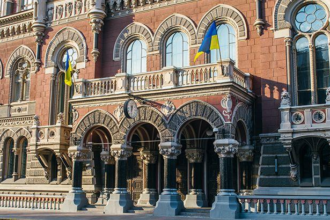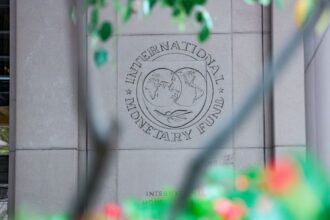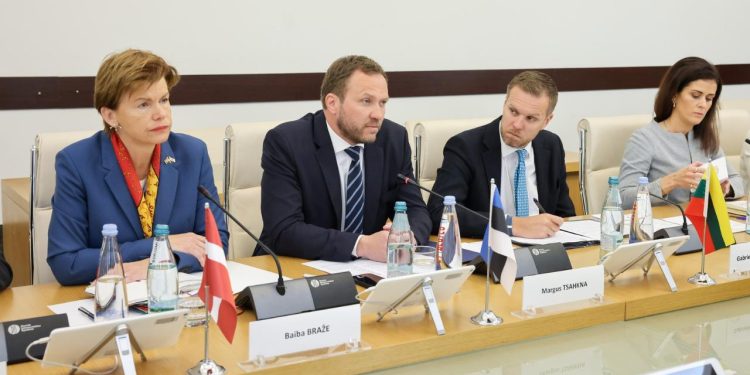The heads of the four foreign ministries met with President Salome Zurabishvili and Prime Minister Irakli Kobakhidze as well as Speaker of Parliament Shalva Papuashvili as well as representatives of the opposition, non-governmental sector, and the non-governmental sector.
After the meetings, they announced their findings at a press conference.
At a press conference in Tbilisi, Lithuanian Foreign Minister Gabrielius Landsbergis stated that the only war party in Moscow is the one that attacked Georgia in 2008.
He said that those who value their freedom have a duty to fight for it and win.
“The only war party in Moscow.” This is the same party that attacked Georgia and Ukraine in 2008 and is now waging war against Ukraine’s territorial integrity and sovereignty. It is our duty to those who value liberty to fight this party, and win this battle,” said Landsbergis.
Margus Tsahkna, the Estonian Foreign Minister, also commented on the narrative of the “global party for war”, calling it “false”.
“It is not a joke because it is a serious matter and it’s part of the Kremlin narrative. We don’t want even to debate the Kremlin narrative because it is a false narrative.
Tsakhkna said that there was a strong desire to join the European Union and to share the same values. “There is no place in this world for Kremlin narratives,” he added.
Tsahkna said at a recent press conference that visa liberalization was not a guarantee.
According to him, if things don’t go well, the EU could impose sanctions.
According to the minister, the fact that the Georgian government adopted the law mentioned instead of nine steps is an example of going in a completely different direction, not toward the European Union but towards another city.
“The main message I want to convey is that the Georgian government cannot fully appreciate what we’ve already decided about Georgia’s path towards the European Union. I am talking about the visa liberalization, among other things.
My position was clear: if the situation deteriorated, the EU could introduce sanctions. The EU does need a consensus in order to introduce common sanctions. However, we also have our member states.
My message was clear: visa liberalization wasn’t guaranteed because we had an agreement, and the Georgian Government promised us a lot of things, including these nine steps. The Georgian government instead of taking these steps adopts this new law. This is the exact opposite of what was done. As my colleague pointed out, not towards the EU but towards another city.
This is not what Georgians want. My message was clear: these things aren’t guaranteed, and the responsibility is with the Georgian Government, not the Georgian People”, said Tsahkna.
“The Georgian Government is not fulfilling its Promises to the European Union. If the Georgian Government follows the steps that it has already planned there will be consequences,” added he.
He said that the “Transparency of Foreign Influence” law is a symbol for a path, and the path is away from the EU.
Our message was very clear: The Georgian people are moving towards the EU. They really share and follow the values. But there are only two options – either towards the EU or Russian influences. There are no alternatives.
We have stated that the EU has already taken many decisions on many issues – visa liberalization and candidate status, as well as 9 steps of recommendations for the Georgian Government to follow.
In reality, however, the Georgian government does not keep its promises. If the government of Georgia continues to take the steps that it has already planned there will be consequences. This law is a symbol. It is a path that is not towards the European Union but away from it.
Tsahkna stated that it is important to make clear that the message we send back to the European Union – that this direction is not the correct one – is very direct. This responsibility belongs with the Georgian Government, not the Georgian People.
“With this bill, the path to European Union is not just more difficult, there is no way at all – Lithuanian foreign minister Gabrielius Landsbergis said.
“We came with a clear message that we are here to support the people. 86% of Georgians who want to join the European Union should know that the European Union stands with them. This was the message.
The second message goes to the government. We cannot be fooled into thinking that the law is transparent, even though the law is still being drafted. It has passed third reading and is now awaiting the president’s veto.
We know today that this law is against non-governmental organizations, civil institutions and those who oppose government policy. This law can be used as a tool to silence these institutions, and it goes against the fundamental principles of democracy that the European Union is based on.
I cannot believe that countries such as ours – Estonian, Lithuanian, Latvian – could have been accepted into the European Union had we had laws like those being considered by Georgia. Our message is clear: there is no way to the EU with this law. It is painful to say, but it must be said.
I hope that the message reached the government. They can still drop this law as they did after a presidential-veto in 2023. They then sat with the institutions of European Union, along with our representatives. We are ready to work in order to advance Georgia onto the Euro-Atlantic pathway”, said Landsbergis.
Read More @ georgiatoday.ge




